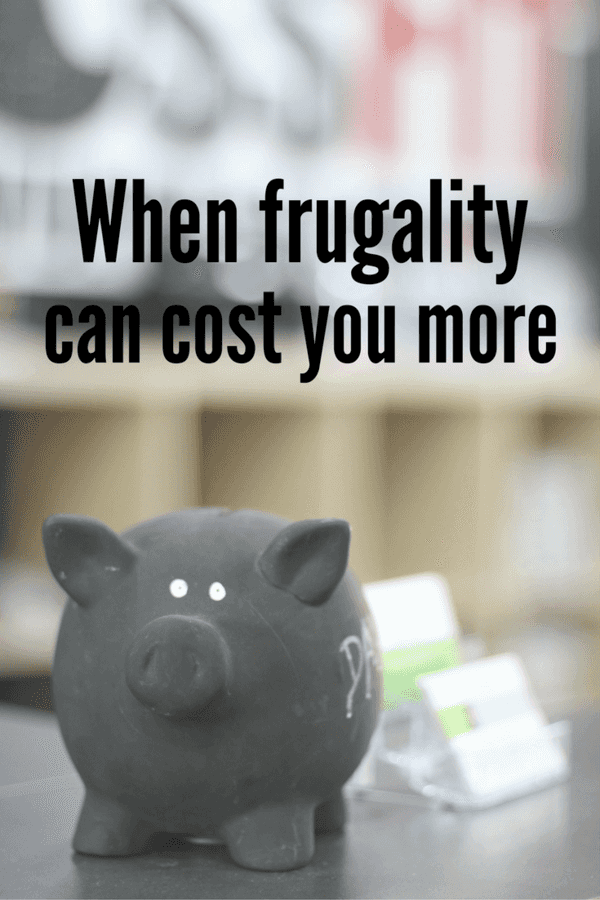
Being frugal and watching your pocketbook can be pretty smart – but I’ll be honest and say that sometimes it can also be not so smart.
People all over share tips to being more frugal – honestly, we see them every day. There are those extreme couponers, then there are reality TV shows that highlight the art of frugality (extreme cheapskates?)
It’s pretty amazing stuff when people want to make sacrifices to keep more of their money in their pocket. But in some cases, it can also backfire, too — being frugal is great, but being too frugal can cost you more.
Unfortunately not all of these ways below are obvious – sometimes it takes a life event for us to step back and say “whoa – I can’t believe that in my haste to save, I was actually spending more.”
Here are some ways we can think of frugality as being more of a detriment than an asset:
#1 – Not Saving Money
Many families are paycheck to paycheck, and as a result, saving money to establish an Emergency Fund ( or, retirement) may not be on your list of priorities.
You work too hard to not pay yourself first – and it’s detrimental that you have some type of an emergency fund to better prepare yourself for situations that might arise… whether that be a broken water heater, transmission issue, or sudden job loss.
Budgeting your money and curbing unnecessary expenses to free up money you can put away might be your best bet. By avoiding opportunities to save, you not only put yourself in a predicament if things pop up unexpectedly, you also lose time, and compound interest.
#2 – Ignoring your Need for Insurance (Life, Auto, Home)
Most people know the importance of auto insurance and home insurance, but life insurance usually goes on the backburner. And that is just as important if not more, than anything else.
Life insurance protects your family if something were to happen to you – and while it might not be an expense you think you can squeeze, it’ll cost you later on if something does happen – funeral costs, and lost income that could have been prevented with some planning.
An inexpensive term policy is the best option – at the same time, working to pay off your debt and save money so that later on when the term expires, you’re debt free and self insured.
#3 – Avoiding the Dentist
When you tend to put off a visit to the dentist because you know you won’t be able to afford the consequences of that visit (ie. crown, root canal, cavity) you could possibly end up having more dental work long term. And that is because those procedures that you have put off can really put your health in jeopardy – that cavity can turn into an infection.
That needed root canal can turn into an abscess tooth – and eventually you will end up spending more than what you had expected, and you might even put your own health at risk.
#4 – Unnecessary Shopping
If you are purchasing items that are cheap just because you have an addiction to clearance racks or sale items, that can be troublesome. Even more, sometimes people will buy things just because they have a coupon for it – but they may not necessarily NEED that item.
Sure, a good sale or clearance is amazing, but spending money is spending money – regardless of if it’s $1 or $100.
#5 – Putting OFF your Retirement Account
So frugal that you can’t squeeze out enough to put away for retirement? Being frugal is great, but not seeing the long term viability in investing is not going to help you. It’s important to budget out a set amount each month to put away for retirement, no matter how much you make.
Through regular, consistent contributions and compound time and interest, that commitment will pay off in terms of a pretty generous fund that will be there for you in your later years.
#6 – Pulling from your Retirement Account
While not putting away will be more costly to you in the end, pulling FROM your retirement account can be just as dangerous. For some people, it might be their way of getting what they feel they need (e. a house, so you pull out your retirement for a down payment or new furniture).
But pulling from that account can put you in a predicament when you need to retire later on. You can work hard to put back that money but you won’t be able to make up for lost time and compound interest.
#7 – Scooping up the Sale Items
Sure… seeing those sale items at the supermarket may tempt you into throwing them in your cart. And yes, you might spend less money overall – but look at the quality of the items you are buying.
Some foods are cheap for a reason, and most items at the supermarket are unhealthy choices to begin with. Anything with Soy, or anything that is processed is an unhealthy choice – whether or not you agree, these choices can lead to health issues later on and more doctor care, visits, a higher premiums later on.
Believe it or not, eating healthy, organic food is very affordable.
#8 – High Deductible Insurance Policies
It’s a given, that you need auto and medical coverage just as much as you need a life insurance policy. In some cases, your car insurance might be more than what you want to pay for a 6 month premium. Is yours?
In that case, they may offer you a higher deductible.
But be careful with that high deductible – while it might save you on your monthly premium, if you do need the policy to pay for your car, you don’t want to be in a predicament where you can’t afford to hand over the deductible to get your car repaired.
The same goes with medical – if your premiums are affordable, that’s great – but if your deductible is high, and you need medical care later on, then you run the risk of not being able to get the care you need when it matters the most.
#9 – Wasting Time
Many people forget about this one – time is ALSO money. Sure, you can spend hours clipping coupons each week, but sometimes, buying from Amazon, in bulk at Costco or, making the item(s) yourself can be even more cost effective.
Even more, driving to the next store to pick up the item that is out of stock is not cost effective either – as the price of gas can add up quickly (and your own time, too).
Saving money is great, but just remember that your time equates to money, too.
#10 – Maintenance
When we say maintenance, that could mean everything from mechanical things at home (perhaps your air conditioner) to your vehicles. Regular service and maintenance will preserve the life and prevent you from having to make costly repairs.
Take those of us in Arizona, for example – it’s rather hot here, and thus important that we seek regular service on our Air Conditioning units. Without service, we might face a problem that could have been prevented – and that problem could lead to us not having cool air conditioning during some of the hottest parts of the year – not fun.
The same goes with your vehicle – regular service is important, whether or not you do it yourself OR take it to a mechanic. That goes for changing your motor oil regularly, rotating tires, balancing tires, checking the timing belt, maintaining fluids, filters and even keeping the tire pressure at the proper levels.
Car repairs are expensive – but regular maintenance can sometimes mitigate a costly repair down the road, no matter if you have a new car or older vehicle.
And while you might be able to do some of it yourself, don’t try to be too “frugal” that you attempt to fix things that you know you can’t handle – because your attempted knowledge might do more harm than good.
#11 – Not Seeking Professional Help
This is one that rings true for our family – perhaps not “us”, but it does resonate with people in our family and we see this every, single year. Have you skipped out on paying a tax professional just because you would prefer to do your own taxes or have someone in your family do them for you?
Sure, you might save short term, but the expertise and value that these tax professionals will give you are far greater than the cost savings you initially thought you would have.
#12 – Being that Bargain Hunter
If you run out to your nearest retail store every time there is a holiday sale (30, 40 or 50%), or are lined up every black Friday to score the next best price on that TV you need want SO bad, you might find that you don’t truly need those items.
Sure, you are saving money buying those sale items – after all, some of those items are 25%, 30%, or even as much as 75% OFF – but stop and think for a minute:
- Do you NEED those items? Are they life necessities?
- Is it detrimental that you shop that after Christmas sale?
- Will the earth stop turning if you miss that sale?
Chances are, you answered a huge NO to all of those – sure, it’s nice to scoop up holiday clearance, get a bargain on something you had planned on buying anyways – but in the big scheme of things, let’s remember that these items are not truly life necessities.
#13 – Too Frugal to Enjoy the Obvious
Some people are so obsessed with being frugal and pinching pennies that they forego opportunities to spend time with their family and kids. Enjoying time with your loved ones doesn’t always mean spending huge amounts – but don’t hold back from opportunities to meet new people and see new places just because you don’t want to spend any money.
Some of those experiences are the ones that your kids will remember more than anything else.
For MONTHS I hesitated to buy the POGO pass because it seemed like it was not affordable for my family – but after thinking about it at length, we realized that it really IS an affordable way for our large family to spend time together.
In the end, you always want to be smart with your choices to spend money – after all, you work hard for it. But always try to ask yourself if the deal is really a legitimate “deal” or, if the savings you are trying to grab in the beginning might make you pay more out of pocket down the road at a later time.




Leave a Reply
You must be logged in to post a comment.